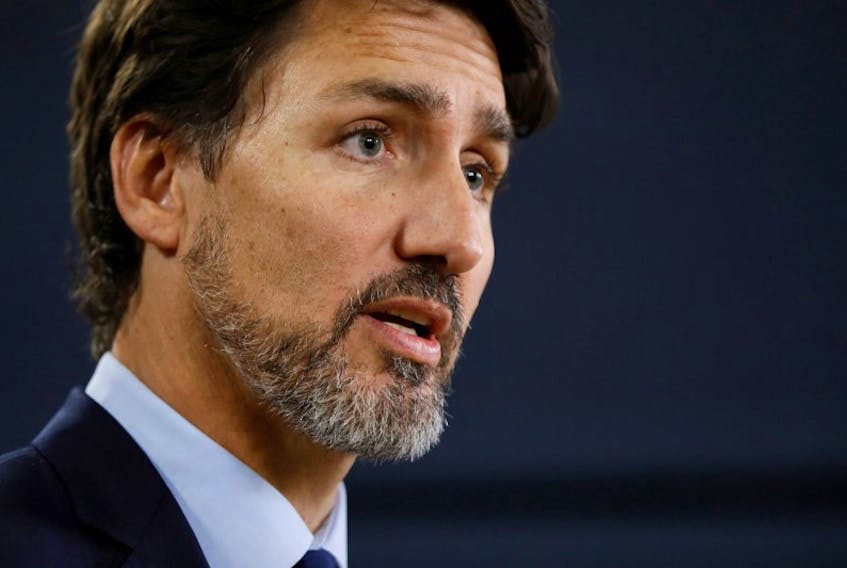After sitting for less than two weeks following the October election, the House of Commons returns in full swing Monday, and the first order of business, according to the prime minister, will be ratifying the new NAFTA deal.
Justin Trudeau spoke with reporters during a press conference Tuesday morning in Winnipeg following a three-day cabinet retreat where the PM said his inner circle hammered out priorities for the upcoming session.
Trudeau confirmed that the government would table a ways-and-means motion Monday followed by legislation Wednesday to finally ratify NAFTA 2.0 aka the Canada-United States-Mexico Agreement (CUSMA) after more than a year of talks, with the aim of ratifying the new deal responsibly but quickly as possible.
“Passing the new NAFTA in parliament is our priority, millions of Canadians depend on stable, reliable trade with our largest trading partners, from farmers in Alberta and auto workers in Windsor to aluminum producers in Saguenay and entrepreneurs in St. John’s and Vancouver,” he said.
The Prime Minister also acknowledged that there would need to be open communication between the minority Liberal government via house leader Pablo Rodriguez and the other parties to ensure the legislation passes.
“What we've been doing is reminding everyone in the house and across the country how important it is to secure our most important trading relationship for future generations and to secure jobs for workers right across the country that rely on trade with the United States,” he said
“We continue to do things like protecting supply management and ensuring that cultural exemption that is so important for cultural industries.”
Assault weapons have “no place in our communities”

During the three days of meetings Trudeau said cabinet was able to focus on important files like the aftermath of the tragic downing of a plane by Iran causing the deaths of 176 passengers and crew, including many Canadians, as well as things the importance of fighting carbon emissions in light of increasing occurrences of climate change related disasters.
“We will (...) be moving forward on significant initiatives to protect our environment, we will be moving forward on measures to ensure better health outcomes for Canadians, we've heard very clearly these are the things that are top of mind for Canadians as we move to grow the economy and secure a better quality of life and affordability for all Canadians.”
Another top topic of discussion during the retreat was strengthening gun control, a key campaign promise from the Liberals. Trudeau said immediate steps towards that end will be led by public safety minister Bill Blair in the coming weeks.
“We will be moving forward on a ban on assault weapons because we know that weapons designed to kill the largest number of people in the shortest amount of time have no place in our communities,” Trudeau said.
He also said the government will move forward on other measures to strengthen gun control, from empowering jurisdictions who want to ban hand guns to do so and investing in better community supports to strengthening border services including ammunition control and the ability to intercept guns coming in from the United States.
“We're already working on a number of (measures) and we will continue to work on those issues through the coming months.”
Evolving medical assistance in dying

Earlier this week, Justice Minister David Lametti confirmed plans to table new legislation in February amending the criteria for medical assistance in dying. This follows ongoing public consultation both online and via cross-country round tables, prompted by a September Quebec Superior Court Justice ruling wherein the existing legislation was declared unconstitutional and the federal government given six months to update it.
When asked to comment on the forthcoming changes, Trudeau said the most important thing in developing a new framework for medical assistance in dying is getting the balance between protecting the vulnerable and respecting the rights of Canadians,
“We knew when we put forward that law that big change for Canadian society a number of years ago that there would be further reflections that there would be refinements (...) getting that balance right was always going to be something that evolves in society that we need to keep working on getting right,” he said.
“How far that will go, whether it's certain elements first and other elements later, that's part of the reflections we are having as we listen to Canadians.”
As Members of Parliament prepare to head back to the House of Commons, Trudeau said the resilience of Canadians as demonstrated in the aftermath of recent events like the tragedy in Iran and a devastating blizzard in Newfoundland that has seen some parts of the province under lockdown for days will hopefully remind members of what’s important.
“In difficult times (Canadians) are there for each other we lean on each other, we support each other through challenges. That's very much the approach Canadians have shown us all over these past weeks, and it is certainly the approach we will engage in the House of Commons looking to find common ground with our colleagues (...) and looking to work together on bringing forward real measures to help Canadians.”
IF YOU'RE NOT FAMILIAR WITH THE RIGHT-TO-DIE DEBATE, CHECK OUT THE STORY OF AUDREY PARKER

RELATED:









